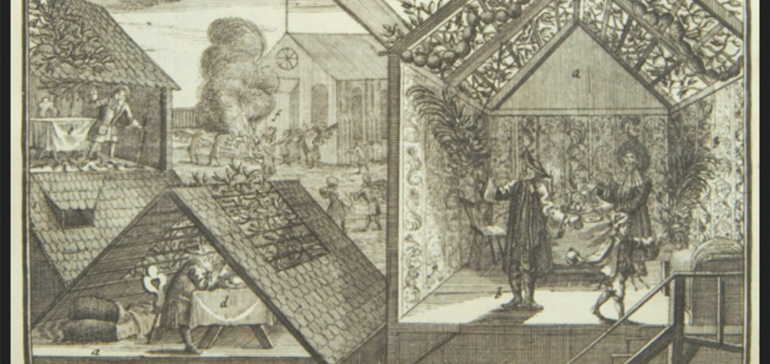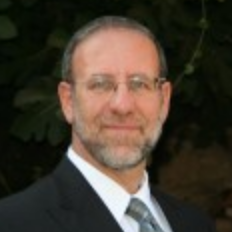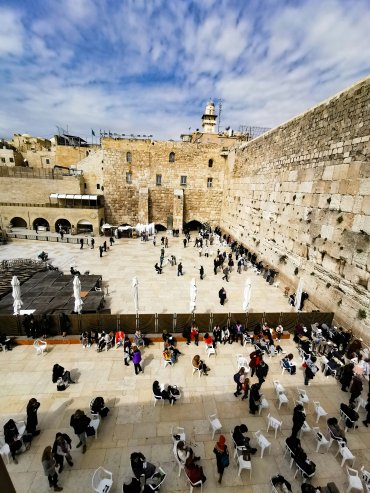
We Are In A Constant State Of Flux: This Perfectly Ties Into Sukkot
lim·i·nal (ˈlimənl/) adj.
1.
of or relating to a transitional or initial stage of a process.
2.
occupying a position at, or on both sides of, a boundary or threshold.
limen noun (plural limens or limina |ˈlimənə|) psychology
a threshold below which a stimulus is not perceived or distinguished from another.
ORIGIN -mid 17th century: from Latin, ‘threshold.’
One of the qualities of the post-modern world in which we live is the constant state of flux: Things move rapidly. People and ideas change. Old accepted concepts are challenged, rejected, transformed and reinterpreted. Sacred cows are slaughtered, or perhaps set free. It is a world in which boundaries have disappeared. Social scientists might describe our postmodern existence as a state of constant liminality: We are consciously, constantly, on the threshold of a new reality.
The term liminality was first used in the study of anthropology to describe movement between stages, the crossing of a threshold (a limen). While “preliminary” or “subliminal” have entered into popular discourse, “liminality” remains the property of the rarefied strata of the social sciences. As boundaries disappear, the limen changes; the constant redefinition of borders is a defining feature of postmodernism.
What does all this have to do with our religious experience, or the experience of the holidays? In Transforming Worship, author Timothy L. Carson includes a chapter entitled “Betwixt and Between, Worship and Liminal Reality,” in which he describes Yaakov’s vision of the ladder ascending to heaven as follows (p. 61): “Jacob’s dream floats somewhere in the sacred axis between heaven and earth.” While much of Carson’s analysis would be foreign to the traditional Jew, his observation of the liminality of the scene in which Yaakov, in a dream state, observes a passage from earth to heaven and back again, is an important insight. What Carson fails to observe is the decidedly non-liminal conclusion of the scene: We as readers, and Yaakov himself, take away from the vision a decidedly different sort of message, recasting the vision into what can only be described as a preliminal state of consciousness.
Indeed, Yaakov/Yisrael – as the individual representative of the future nation that will bear his name – lives in a preliminal state. The land promised to him never quite becomes his; only in the future will his descendants inherit and inhabit the land. The vision of the ladder, the threshold between the physical world and the higher spiritual world, is an expression of the liminal; the lesson he learns from it for his own life is distinctly preliminal. He understands that the challenges he will face are precursors of a very different reality that he himself will not experience. His task is to lay the groundwork, but he personally will not cross the threshold.
Upon awaking from the dream state, Yaakov concludes that the ground beneath him is holy and that on this very spot he must build a structure, one with tangible, physical boundaries: He must build a temple.
“Let this stone that I have set up as a pillar become a temple to God. Of all that You give me, I will set aside a tenth to You.’” (Bereishit 28:22)
As Moshe prepares to take his leave from the nation, they stand poised to cross the threshold into a completely new reality as a nation in its own land. As they prepare to actualize the promise made to their forefathers and to inherit the Land of Israel, Moshe’s description of the nation, specifically as descendants of Yaakov and in contrast to all other nations of the world, are instructive:
When the Most High gave nations their homes and set the divisions of man, He fixed the boundaries of peoples to parallel the number of Israel’s descendants. For God’s portion is His people, Yaakov His own allotment. He brought them into being in a desert region, in a desolate, howling wasteland. He encompassed them and granted them wisdom, protecting them as the pupil of His eye. (Devarim 32:8-10)
While the section is highly poetic and sometimes difficult to penetrate, some of the elements are clear: Moshe’s speech begins with what we may call spiritual geopolitics: God created clearly defined borders for the nations of the world, affording each its own space – but this overarching division reflects something that is particular to the descendants of Yaakov. In Bereishit (Chapter 46), the Torah tells us that the sum total of Yaakov’s family that migrated to Egypt during the great famine was 70. Corresponding to this number, Jewish tradition refers to the totality of humankind as “the 70 nations of the world,” all descended from Noah after the flood (Bereishit Chapter 11). The peoples of the world were divided, both linguistically, culturally and geographically, when they misused their unity to rebel against God in the aftermath of the great deluge.
We should note that the substance of that rebellion was the construction of a tower in the valley of Shinar, with which the rebels hoped to wage a war against the heavens. Significantly, the tower is described in terms very similar to those used to describe the ladder in Yaakov’s vision: Its head reached the sky (Bereishit 11:4). The tower represented a monolithic unity, a unity that did not tolerate individuality. The descendants of Noah chose to wage a battle against God; they sought to replace the God who had brought about the holocaust and destruction of the flood, and they allowed no individual dissent. In response, God dispersed them, creating obstacles that would differentiate for all time between the various branches of the family of man.
In contrast, Moshe refers to the Jewish People as Yaakov (D’varim 32:9), and the foundational experience of Jewish nationhood is depicted in a desolate wilderness, a place without borders, in which they are surrounded by God alone. The Torah describes the Jews being “encompassed,” and the commentaries understand that this was the Divine protection afforded by the Clouds of Glory.
In commemoration of these clouds, and of this experience of God’s protection and the love with which he enveloped us in the wilderness, the holiday of Sukkot was instituted. The sukkah is a modest structure, with no real boundaries. The walls may be made of wood, fabric, or even bits of string. The sukkah is a halachic construct, a philosophical construct, if you will; therefore, the walls need not be “real” barriers of brick and mortar. A set of strings tied three handbreadths apart is enough to create a theoretical wall according to halachah, and that is enough to make a sukkah “kosher.”
Perhaps the sukkah is the antithesis of the postmodern state of liminality: We are commanded to create boundaries, to mark off both physical and philosophical borders. There are absolutes, and we are commanded to acknowledge and respect them. Common wisdom understands that children need rules in order to thrive and to make sense of the world around them; this is no less true of adults. We need borders and boundaries. Not everything is negotiable, subject to subjective reinterpretation. Things need firmness. The postmodern rejection of historical fact in favor of subjective narrative flies in the face of truth, and of Torah.
How appropriate that on the holiday of Sukkot, as we celebrate the Divine protection given to the Jewish people in the desert, we respond to God’s kindness by not only building the sukkah, but by bringing precisely 70 sacrificial offerings – in the name of the entire family of man, the 70 nations that were demarcated and dispersed after the failed rebellion of the tower. While good fences make neighbors and we are commanded again and again to be mindful of the boundaries between our nation and the nations that surround us, we are also commanded to remember the neighbors on the other side of the fence – as well as the brothers and sisters that share the holy space within the fence.
Yes, Jews create boundaries; yes, these boundaries can and do lead to “otherness.” As Jews, we live in a world of absolutes, yet we are commanded by the same Torah that creates the boundaries never to forget that we are part of a larger world. We have Torah-mandated responsibility for those within the camp, as well as for those who remain beyond the philosophical and physical borders we construct.
If you found this content meaningful and want to help further our mission through our Keter, Makom, and Tikun branches, please consider becoming a Change Maker today.







